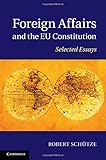Foreign affairs and the EU constitution : selected essays / Robert Schütze.
Material type: TextPublication details: United Kingdom: Cambridge University Press, 2014.Description: xxxiv, 522 pages : illustrations ; 24 cmISBN:
TextPublication details: United Kingdom: Cambridge University Press, 2014.Description: xxxiv, 522 pages : illustrations ; 24 cmISBN: - 9781107037663
- 1107037662
- 341.2422 SCH.F
| Item type | Current library | Call number | Copy number | Status | Date due | Barcode |
|---|---|---|---|---|---|---|
 Books
Books
|
Symbiosis Law School, Noida | 341.2422 SCH.F (Browse shelf(Opens below)) | 1 | Available | SLSN-B-8547 |
Browsing Symbiosis Law School, Noida shelves Close shelf browser (Hides shelf browser)

|

|

|

|

|

|

|
||
| 341.2422 PRA.I Introduction to the International Court of Justice | 341.2422 PRE.D Directives in EC law / | 341.2422 SAY.A Abuse of EU law and regulation of the internal market | 341.2422 SCH.F Foreign affairs and the EU constitution : | 341.2422 SHA.L Law of the European Union | 341.2422 STE.E Economics of European Union law | 341.2422 TUR.J Judicial review in EU law |
Includes bibliographical references and index.
Machine generated contents note: Introduction; Part I. International Law and the EU Constitution - Normative Aspects: 1. On 'federal ground': the European Union as an (inter)national phenomenon; 2. On 'middle ground': the European Union and public international law; 3. The 'succession doctrine' and the European Union; 4. European law and member state agreements: an ambivalent relationship?; Part II. Foreign Affairs and the EU Constitution - Vertical Aspects: 5. Federalism and foreign affairs: mixity as an (inter)national phenomenon; 6. Dual federalism constitutionalised: the emergence of exclusive competences; 7. Parallel external powers: from 'Cubist' perspectives towards 'naturalist' constitutional principles?; 8. The ERTA Doctrine and cooperative federalism; Part III. Foreign Affairs and the EU Constitution - Horizontal Aspects: 9. External Union powers: competences and procedures; 10. External Union legislation: international agreements; 11. The 'treaty power' and parliamentary democracy: comparative perspectives; 12. External Union policies: a substantive overview; Annex. Foreign affairs provisions in the EU Constitution (selection).
"Foreign affairs are 'border' affairs - in a geographical and a constitutional sense. They are traditionally subject to distinct constitutional principles, for the political questions posed might not be susceptible to legal answers. And yet: in our globalized world, the orthodox distinction between 'internal' and 'external' affairs has lost much of its clarity. The contemporary world is an international world - a world of collective trade agreements and collective security systems. The European Union - as a union of States - embodies this collective spirit on a regional international scale. But what is the relationship between this new European legal order and the old legal order of international law? When can the Union act on the international scene and, if so: how? "Foreign Affairs and the EU Constitution" brings together a collection of outstanding essays on external relations written by one of the leading constitutional scholars of the European Union"--



There are no comments on this title.